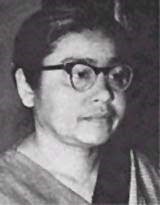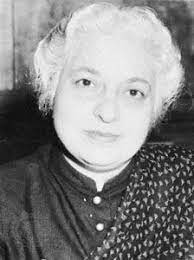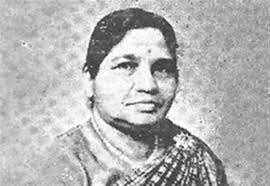PREVIOUS
Women Leaders in Constituent Assembly of India – PART V
June 9 , 2023
666 days
3250
0
(இதன் தமிழ் வடிவத்திற்கு இங்கே சொடுக்கவும்)
13.Sucheta Kripalani
- Sucheta Kripalani was an Indian freedom fighter and politician.
- She was born on 25 June 1908.
- She was born in Ambala, Punjab (now in Haryana) into a Bengali Brahmo family.
- Her father Surendranath Majumdar, worked as a medical officer.
- She studied at Indraprastha College and Punjab University before becoming a professor of Constitutional History at Banaras Hindu University.
- In 1936, she married J. B. Kripalani, a prominent figure of the Indian National Congress.
- She participated in the White Quit Movement.
- She was arrested by the British just as Aruna Asaf Ali and Usha Mehta were arrested for participating in the White Quit Movement.
- She later worked closely with Mahatma Gandhi during the Partition riots.
- When Gandhi went to Noakhali in 1946, she accompanied him.
- She was one of the few women who were elected to the Constituent Assembly of India.
- She was elected as the first woman CM of state of Uttar Pradesh from the Kanpur constituency and was part of the subcommittee that drafted the Indian Constitution.
- On 14 August 1947, she sang Vande Mataram in the Independence Session of the Constituent Assembly a few minutes before Nehru delivered his famous "Tryst with Destiny" speech.
- She was also the founder of the All-India Mahila Congress, established in 1940.
- After independence, she remained involved with politics.
- For the first Lok Sabha elections in 1952, she contested from New Delhi on a KMPP (Kisan Mazdoor Praja Party) ticket.
- She was elected one last time to the Lok Sabha in 1967, from Gonda constituency in Uttar Pradesh.
- She had also become a member of the Uttar Pradesh Legislative Assembly.
- From 1960 to 1963, she served as Minister of Labour, Community Development, and Industry in the UP government.
- She became the Chief Minister of Uttar Pradesh in October 1963.
- She is the first Indian woman to hold this position.
- When Congress split in 1969, she left the party with Morarji Desai faction to form NCO.
- She lost 1971 election as NCO candidate from Faizabad (Lok Sabha constituency).
- She retired from politics in 1971.
- She died on 1 December 1974.

14. Vijaya Lakshmi Pandit
- Vijaya Lakshmi Pandit was an Indian freedom fighter, diplomat and politician.
- She was born on 18 August 1900.
- She was born as the daughter of Motilal Nehru-Swarubirani Dhu from a Kashmiri Pandit family.
- She was Hailing from the prominent Nehru-Gandhi political family.
- Her brother Jawaharlal Nehru was the first Prime Minister of independent India.
- Her niece Indira Gandhi was the first female Prime Minister of India.
- Her grand-nephew Rajiv Gandhi was the sixth and youngest Prime Minister of India.
- She was sent to London as India's most important diplomat after serving as India's envoy to the Soviet Union, the United States, and the United Nations.
- She attended the 1916 Congress session that took place in Lucknow.
- She was impressed by Sarojini Naidu and Annie Besant.
- In 1920, she spent time in Mahatma Gandhi's ashram close to Ahmedabad.
- She also worked in the office that used to publish Young India.
- Pandit was the first Indian woman to hold a cabinet post in pre-independent India.
- In 1936, she stood in general elections and became member of parliament by 1937 for constituency of Cawnpore Bilhaur.
- In 1937, she was elected to the provincial legislature of the United Provinces and was designated minister of local self-government and public health.
- He was arrested several times by the British government for his participation in the Indian freedom struggle.
- She was jailed for 18 months from 1931 - 1933.
- She was jailed again for 6 months in 1940 before getting jailed in 1942 for 7 months over her participation in the Quit India Movement.
- After her release, she helped the victims of the Bengal famine of 1943.
- She served as president of the Save the Children Fund Committee which rescued poor children from the streets.
- Following her husband's death in 1944, she also experienced the suffering of Hindu widows and campaigned in the All-India Women's Conference for changes in these laws.
- In 1946, she was elected to the Constituent Assembly from the United Provinces.
- She was India's ambassador to the Soviet Union from 1947 to 1949, the United States and Mexico from 1949 to 1951, Ireland and Spain from 1955 to 1961 and Spain from 1956 to 1961.
- She was also the Indian High Commissioner to the United Kingdom from 1949 to 1951.
- She headed the Indian delegation to the United Nations between 1946 and 1968.
- In 1953, she became the first woman president of the United Nations General Assembly.
- In 1978, she was inducted as an honorary member of Alpha Kappa Alpha Sorority for this achievement.
- She served as Governor of Maharashtra from 1962 to 1964.
- She returned as a member of parliament for 1964 to 1968 with her election victory in Phulpur.
- After the declaration of Emergency in 1975, Pandit was a strong critic of Prime Minister Indira Gandhi.
- Pandit retired from active politics after relations between them soured.
- On retiring, she moved to Dehradun in the Doon Valley in the Himalayan foothills.
- In 1979, she was appointed the Indian representative to the UN Human Rights Commission, after which she retired from public life.
- Her writings include The Evolution of India (1958) and The Scope of Happiness: A Personal Memoir (1979).
- She died on 1 December 1990.

15.Annie Mascarene
- Annie Mascarene was an Indian independence activist, politician and lawyer from Thiruvananthapuram, Kerala who served as a Member of the Parliament of India and was the first woman to do so.
- Masukaren was born in Thiruvananthapuram on 6th June 1902 in a Latin Catholic family.
- Her father, Gabriel Mascarene, was a government official of the Travancore State.
- She attended the Maharaja's College Travancore earning double M.A. in history and economics in 1925.
- She went on to earn a degree in law at the Maharaja's Colleges for Arts and Law, Trivandrum, following her return from a teaching stint in Ceylon.
- Along with Akkamma Cherian and Pattom Thanu Pillai, Mascarene was one of the leaders of the movements for independence and integration of the Princely States within the Indian nation.
- She was the first woman to join the Travancore State Congress when a political party was formed in February 1938.
- The party's objective was to establish a responsible government for Travancore, with Pattam Thanu Pillai as its leader.
- She was arrested several times between 1939 and 1947 for his anti-British activities.
- In 1938 and 1939, Mascarene served on the Economic Development Board of the Travancore government.
- During her time in the state legislature, she became a powerful speaker.
- In 1942, Mascarene joined the Quit India Movement and two years later was elected as secretary of the Travancore State Congress.
- In 1946, Mascarene became one of the 15 women who were elected to the 299-member Constituent Assembly of India, tasked with drafting the Constitution of India.
- In 1948, she was re-elected to the Travancore-Cochin Legislative Assembly and served until 1952.
- In 1949, she was appointed Minister of Health and Power in Parur DK Narayana Pillai's Ministry.
- She was the first woman minister in the state after independence.
- Mascarene was elected to the First Lok Sabha as an independent candidate from the Thiruvananthapuram Lok Sabha constituency in the 1951 Indian general election.
- She was the first woman MP from Kerala and one of only 10 elected to Parliament in those elections.
- Annie Mascarene died in 1963 and her grave lies at the Pattoor cemetery in Thiruvananthapuram.

Leave a Reply
Your Comment is awaiting moderation.


